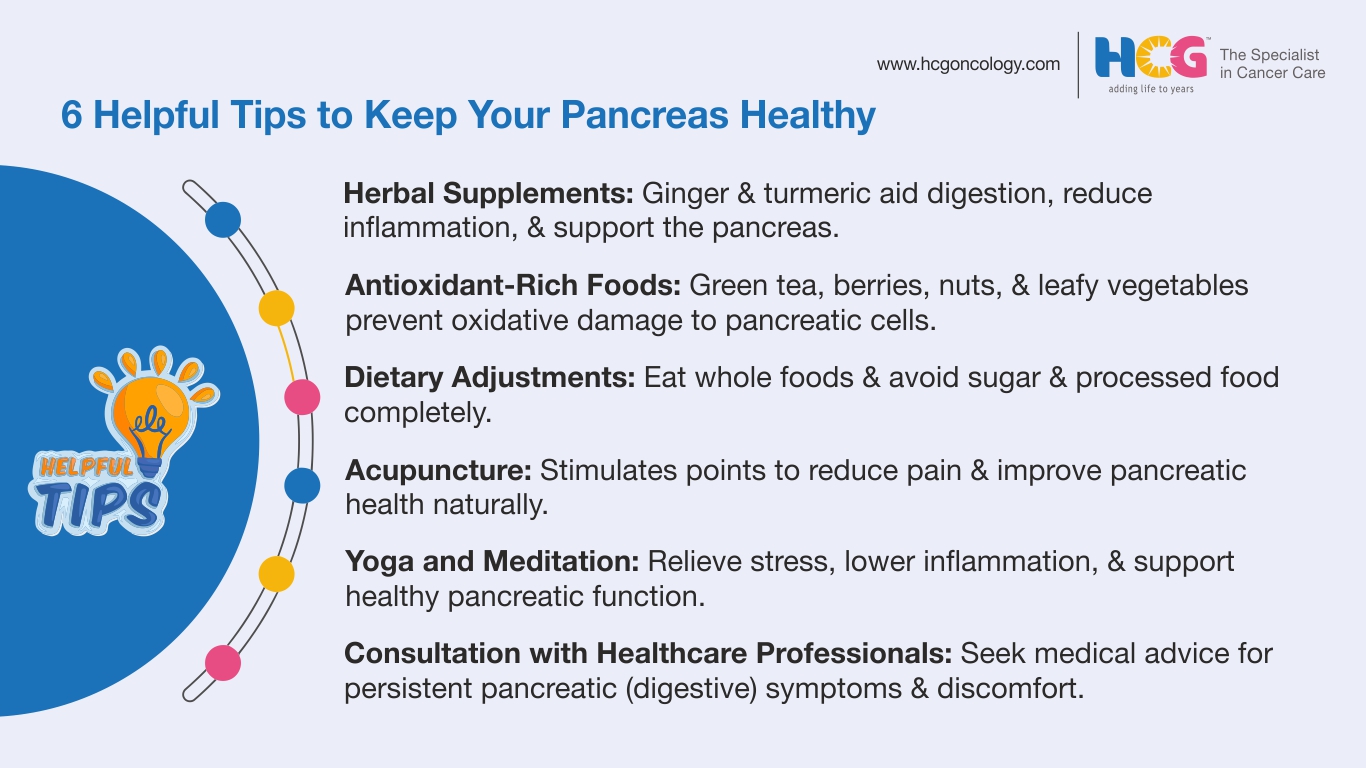
22 Dec, 2025
Feel free to reach out to us.

22 Dec, 2025

This article is medically reviewed by Dr. Harsha Deepti Mamidala, Consultant - Surgical Oncology, HCG Cancer Centre, Vijayawada.
The pancreas is a gland located in the abdomen. It has properties of both the exocrine and endocrine glands. The pancreas performs two crucial functions in the body.
The pancreas synthesizes various hormones that regulate glandular secretion and manage blood sugar levels. These hormones include insulin, glucagon, pro-insulin, somatostatin, amylin, pancreatic polypeptide, and C-peptide.
The pancreas also plays a critical role in the digestion process. The pancreas also produces pancreatic juice that contains certain enzymes. These enzymes assist in the digestion of proteins, fats, and carbohydrates.
Goblet cells present in the pancreas secrete mucus. The enzymes present in the pancreatic juice are trypsin, chymotrypsin, lipase, phospholipase, amylase, and lactase.
Neurohormonal mechanisms and food consumption regulate enzyme secretion. Based on the food intake, the pancreas releases about 1 to 4 liters of pancreatic juice daily.
Some of the common pancreas problems are:
Pancreatitis is a condition characterized by inflammation in the pancreas. It may be chronic or acute. Patients with acute pancreatitis usually have symptoms on the epigastric or right side.
Signs of chronic pancreatitis often involve both the symptoms of exocrine and endocrine insufficiency.
Some of the symptoms of pancreatitis include abdominal pain that may increase with eating and drinking, nausea and vomiting, fever and chills, abdominal swelling and tenderness, low blood pressure, and jaundice.
Pancreatic cancer is a pathological condition that involves uncontrolled division, proliferation, and spread of the pancreatic cells. The majority of pancreatic neoplasms are pancreatic ductal adenocarcinoma.
Most patients are diagnosed at an advanced stage. Patients with pancreatic cancer experience jaundice (yellowing of the eye and skin), weight loss, abdominal pain, weakness, pruritus, dark urine, and distended gallbladder as common symptoms.
A family history of pancreatic cancer, diabetes, obesity, and tobacco use are the key risk factors for pancreatic cancer.
Pancreatic cysts are the fluid-filled pockets inside the pancreas. They are generally identified when the patient undergoes MRI or computed tomography for other reasons. These cysts may be benign or malignant.
Patients with a family history of pancreatic cancer have an increased risk of developing pancreatic cysts.
Pancreatic stones may form for various reasons, including chronic pancreatitis. The stones may be present in the pancreas's main duct, its branches, and the parenchyma.
Symptoms include severe abdominal pain, nausea and vomiting, fever and chills, a swollen or tender abdomen, weight loss, greasy stools, and jaundice.
Treatment options include endoscopic retrograde cholangiopancreatography (ERCP), sphincterotomy, and extraction.
Intraductal papillary mucinous neoplasms (IPMN) are the neoplasms of the pancreas present in the form of cysts. These neoplasms produce mucin and can develop into cancer.
IPMNs are often treated with surgery. The cyst size, main duct obstruction, presence of nodules, and the symptoms presented are the key factors considered before recommending surgery for IPMNs.
Some of the symptoms of IPMN are unexplained weight loss, intermittent stomach pain, back pain, nausea and vomiting, and oily stool.
Several patients ask, “How to keep my pancreas healthy?”. Some of the measures for a healthy pancreas are:
Cruciferous vegetables, such as cauliflower, are one of the healthiest foods for the pancreas. They contain various compounds that will enhance pancreatic health. Leafy vegetables are rich in antioxidants that reduce pancreatic inflammation.
Whole grains such as oats ensure better digestion, lowering the pancreas's workload.
Beneficial fruits for pancreas health include apples, berries, and citrus fruits. They have important vitamins and fiber that promote overall pancreatic function. Consult the doctor for more information about the foods good for the pancreas.
Avoiding certain fruits that are not good for pancreatic health is important. Sugary foods and beverages, such as candies and soft drinks, contribute to insulin resistance, thus increasing the load on the pancreas.
Highly processed foods contain unhealthy fats that interfere with pancreatic function. Excessive alcohol consumption enhances the risk of pancreatitis. Foods that negatively affect the pancreas include fried and oily foods and refined carbohydrates.
Antioxidants and fiber play an important role in promoting pancreatic health. Antioxidants in several foods, such as nuts, leafy greens, and berries, help reduce inflammation and oxidative stress in the pancreas. They also lower the risk of pancreatic diseases, such as pancreatitis.
Fibers in fruits, vegetables, and whole grains improve digestion, maintain blood sugar levels, and lower the pancreatic workload. Fibers lower the risk of developing type 2 diabetes.
Optimal hydration is vital for maintaining pancreatic health. Consuming adequate water assists in producing pancreatic enzymes, thereby improving digestion. Proper hydration also reduces the stress on the pancreas and manages blood sugar levels.
Dehydration interferes with the normal enzyme function, thereby impairing digestion. Further, adequate hydration also flushes out toxins from the body, lowering the risk of inflammatory conditions of the pancreas, such as pancreatitis.
Some of the lifestyle changes that may help in keeping the pancreas healthy (tips for healthy pancreas) are:
Smoking increases the risk of pancreatic cancer as it contains harmful substances that can damage the pancreatic cells. Smoking also plays a role in inflammation, thereby increasing the risk of pancreatitis.
Excessive alcohol consumption causes pancreatic inflammation that may lead to chronic conditions, such as pancreatitis. Further, alcohol may also interfere with enzyme function. Excessive alcohol consumption for a long time may cause permanent damage to the pancreas.
Regular exercise promotes pancreatic health. It helps maintain optimum blood sugar levels by improving insulin sensitivity. It reduces pancreatic workload. Regular exercise reduces the risk of chronic conditions like type 2 diabetes.
Incorporating exercise in the daily routine helps maintain a healthy weight and lowers the risk of obesity, which is a risk factor for pancreatic cancer, type 2 diabetes, and pancreatitis. Exercise also reduces inflammation and improves circulation, thereby supporting overall pancreatic function.
Chronic stress negatively affects pancreatic health. It releases cortisol. High cortisol levels increase blood sugar levels and enhance pancreatic workload. Chronic stress enhances the risk of type 2 diabetes.
Chronic stress also increases inflammation, which negatively affects pancreatic health and increases the risk of pancreatitis. Stress can be managed through meditation, exercise, and deep breathing techniques.
Maintaining a healthy weight is important in promoting pancreatic health. Excessive body weight may lead to insulin resistance. Thus, the pancreas has to release more insulin, increasing its workload. This may lead to strain on the pancreas, which can cause pancreatic dysfunction.
Obesity is also an independent risk factor for pancreatitis and type 2 diabetes. Chronic inflammation due to obesity may also contribute to the development of pancreatic cancer.
Some of the methods to prevent pancreatic disorders are:
Early detection and screening are important in lowering the risk of pancreatic disorders and improving overall outcomes. As serious pancreatic conditions, such as pancreatitis or pancreatic cancer, do not present symptoms at an early stage, it is important to screen individuals, especially those who are at high risk for pancreatic diseases.
Regular screening in individuals with a family history of pancreatic disease or a history of smoking helps detect tumors or cysts in the early stages.
Several preventive measures may reduce the risk of pancreatic conditions, such as pancreatitis. These measures include quitting smoking, maintaining a healthy lifestyle, regular exercise, maintaining a healthy weight, consuming a diet low in sugars and saturated fats, maintaining adequate hydration, and avoiding excessive alcohol consumption.
Pancreatic cancer may lead to several complications and significantly affect the pancreatic function. It is important to lower the risk of pancreatic cancer to maintain the overall health of the pancreas.
Some measures that may reduce the risk of pancreatic cancer are maintaining a healthy weight, limiting alcohol consumption, quitting smoking, regular exercise, managing chronic stress, and eating a healthy diet.
Regular screening in patients with increased risk for pancreatic cancer is crucial in detecting the disease at an early stage.

Some of the alternative therapies for pancreatic health are:
Certain herbal supplements, such as ginger and turmeric, possess antioxidant properties. They also have anti-inflammatory properties that reduce the risk of various pancreatic disorders. These herbal supplements also assist in digestion.
Several foods, such as aloe vera and green tea, are rich sources of antioxidants. These foods contain various compounds, such as polyphenols, that protect the pancreatic cells and have anti-inflammatory properties.
Acupuncture is another alternative therapy that potentially improves pancreatic health. By stimulating specific points, it reduces pain in patients with pancreatitis and improves pancreatic function.
Yoga and meditation also play a crucial role in improving pancreatic health. They assist in managing stress and reducing inflammation.
Healthy nutritional habits are essential for optimal pancreatic health. Individuals should incorporate whole grains and plant-based foods into their diets and avoid sugary and highly processed foods.
If patients experience pancreas-related symptoms, it is crucial to consult with healthcare professionals. These symptoms include abdominal pain, weight gain, fever and chills, nausea and vomiting, and unexplained weight loss.
In conclusion, understanding the pancreas function and maintaining its health is essential for overall well-being. The pancreas plays a critical role in digestion and blood sugar regulation. To keep it healthy, adopt a balanced diet, avoid harmful foods, stay hydrated, exercise regularly, and manage stress.
Early detection, lifestyle changes, and preventive measures can help reduce the risk of pancreatic disorders, ensuring long-term health. Consult your doctor to get tips for a healthy pancreas.
At HCG, we adopt high-end cancer treatment technologies for accurate pancreatic cancer diagnosis and its effective management. This way, we serve as a one-stop solution for high-end pancreatic cancer management.

Dr. Harsha Deepti Mamidala
Consultant - Surgical Oncology
MBBS, MS (General Surgery), MCh (Surgical Oncology)
Dr. Harsha Deepti Mamidala is a young surgical oncologist with expertise in the areas of cancer surgery, organ preservation, and organ reconstruction. She is available for consultations at HCG Curie City Cancer Centre, a well-known cancer hospital in Vijayawada. She has a special interest in the areas of head and neck surgical oncology and breast oncoplasty. Dr. Harsha Deepti focuses on improving health outcomes for her patients using personalized treatment approaches that focus on addressing the specific health needs of each patient.
Appointment Link: Book an Appointment with Dr. Harsha Deepti Mamidala